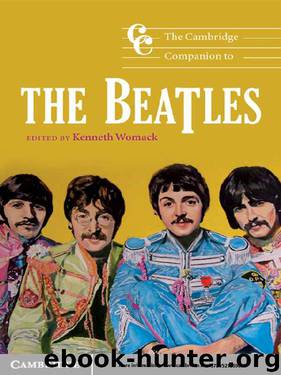The Cambridge Companion to the Beatles (Cambridge Companions to Music) by Kenneth Womack

Author:Kenneth Womack [Womack, Kenneth]
Language: eng
Format: epub
ISBN: 9781139796057
Publisher: Cambridge University Press
Published: 2009-11-12T02:00:00+00:00
John Lennon: “I just believe in me”
On December 30, 1969, UK broadcaster ITV televised Man of the Decade, which included segments on John Kennedy, Mao Zedong, and John Lennon. In February, 1970, Rolling Stone named John Lennon its “Man of the Year.”54 Lennon had a great deal to prove, particularly with an anti-war left still stewing from Lennon's apparent rejection of it on the Beatles’ recording “Revolution.” He had begun to address its concerns and seek common cause with his and Yoko Ono's 1969 peace offensive, and was energized by a new freedom denied him as a Beatle. By the release of Plastic Ono Band (1970), on which he sang “I don't believe in Beatles…I just believe in me,” on the track “God,” he was speaking his mind and acting upon the issues of his time as an individual, without concern for maintaining the Beatles myth.
The Lennons christened 1970 “Year One AP” (i.e. After Peace). Lennon was pleased with the “bed-in for peace” and “War is Over” events of the past year;55 in the following months, however, he was less satisfied with symbolic gestures, and took tentative steps toward greater confrontation with the system. A new agenda required a new look, and in late January, Lennon and Ono had their hair shorn, in Lennon's words to “stop being hyped by revolutionary image and long hair,”56 and donated their locks for auction at a benefit organized by London Black Power leader Michael X.57 An appearance by the Plastic Ono Band58 on Top of the Pops in mid-February 1970 featured Lennon's new look: dressed in a black turtleneck sweater, hair short and uneven, he played keyboard and sang “Instant Karma,” while a similarly coifed and attired Ono sat behind him, her vision obscured by a white blindfold, knitting white yarn. This was a stark picture, one at odds with his Beatles past. For Lennon, ragged and ugly in comparison to the Beatle image, it was a means of breaking even more fully with his pop star past.
Trying to bring some order to their personal lives, Lennon and Ono sought custody (unsuccessfully) of Ono's young daughter, Kyoko. They also underwent four months of primal therapy at Dr. Arthur Janov's Los Angeles Primal Institute clinic, beginning in April 1970. A therapy that attempts to move patients to direct emotional experience of past trauma, thus allowing those repressed feelings to be dealt with openly, Janov's treatment had a profound influence on Lennon and Ono, and much of Lennon's Plastic Ono Band album, released in December 1970, was composed while Lennon was in therapy. A masterpiece, this first truly solo project most closely reflected Lennon's vision of art as emerging from pain.59 In track after track, Lennon bared his soul, in the process skewering every institution that had ever traumatized him, or judged him, or in any sense confined him. This was an album of “Pain,” as understood in primal therapy. Songs like “God,” “Isolation,” “I Found Out,” “My Mummy's Dead,” “Mother,” and perhaps most audibly “Well Well Well” were the direct artistic fruits of Lennon's primal therapy.
Download
This site does not store any files on its server. We only index and link to content provided by other sites. Please contact the content providers to delete copyright contents if any and email us, we'll remove relevant links or contents immediately.
Periodization Training for Sports by Tudor Bompa(8257)
The Body: A Guide for Occupants by Bill Bryson(5082)
The MacArthur Bible Commentary by John MacArthur(4823)
The Sports Rules Book by Human Kinetics(4379)
What It Really Takes to Get Into Ivy League and Other Highly Selective Colleges by Hughes Chuck(3753)
Marijuana Grower's Handbook by Ed Rosenthal(3678)
The Sprouting Book by Ann Wigmore(3587)
The Martian by Andy Weir(3419)
Salt, Fat, Acid, Heat: Mastering the Elements of Good Cooking by Nosrat Samin(3146)
Sapiens and Homo Deus by Yuval Noah Harari(3068)
The Bread Bible by Rose Levy Beranbaum(3066)
Harry Potter 4 - Harry Potter and The Goblet of Fire by J.K.Rowling(3061)
The Marketing Plan Handbook: Develop Big-Picture Marketing Plans for Pennies on the Dollar by Robert W. Bly(3057)
Classic by Mary Berry(3011)
Martha Stewart's Baking Handbook by Martha Stewart(2854)
Screenplay: The Foundations of Screenwriting by Syd Field(2637)
The Plant Paradox by Dr. Steven R. Gundry M.D(2613)
50 Economics Classics by Tom Butler-Bowdon(2568)
The Cambridge Grammar Of The English Language by Rodney Huddleston Geoffrey K. Pullum(2429)
